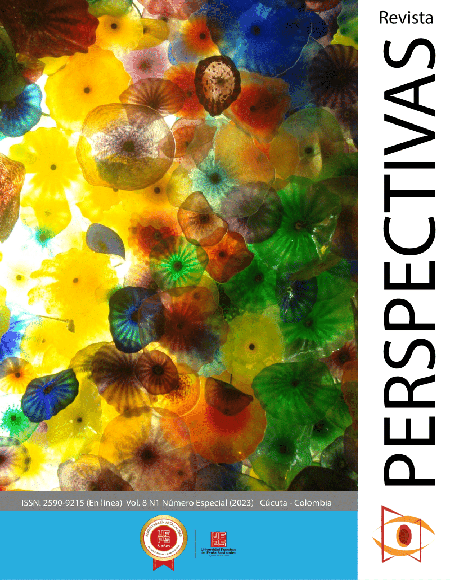Relationship between emotional intelligence variables and strategies for coping with stress in students of a private school in Cúcuta
Relación entre las variables inteligencia emocional y estrategias de afrontamiento del estrés en estudiantes de un colegio privado de Cúcuta
Main Article Content
The main objective of this research was to explore the association between emotional intelligence and coping strategies in a group of 141 ninth, tenth and eleventh grade students in a private school in Cúcuta, Norte de Santander. This study adopted a stratified random sampling approach with proportional allocation and was framed in a non-experimental cross-sectional research design. Emotional intelligence was measured using the Trait Meta-Mood Scale (TMMS-24) questionnaire, while the COPE questionnaire was used to assess coping strategies to stress. The data collected were subjected to statistical analysis in SPSS version 29 software, using Pearson's correlation formula. The results revealed a statistically significant relationship between emotional intelligence and two specific coping strategies: those focused on problem solving and those oriented towards emotional management. However, no significant relationship was observed between emotional intelligence and coping strategies based on behavior modification. In summary, these findings indicate that people with higher emotional intelligence are more likely to employ effective strategies to manage stress, especially those related to regulating their emotions and problem solving. However, they do not necessarily adapt their behavior in response to stress.
Downloads
Article Details
Bonilla Cruz, N. J., Bahamon, M. J., Forgiony Santos, J., Mora Wilches, K., & Montánchez Torres, M. L. (2018). Propiedades psicométricas de la escala de afrontamiento para la intervención psicológica en adolescentes COPE. http://hdl.handle.net/20.500.12442/2881
Fragoso Luzuriaga, R. (2015). Inteligencia emocional y competencias emocionales en educación superior, ¿un mismo concepto? Revista iberoamericana de educación superior, 6(16), 110-125. http://www.scielo.org.mx/scielo.php?script=sci_arttext&pid=S2007-28722015000200006&lng=es&tlng=es. DOI: https://doi.org/10.1016/j.rides.2015.02.001
García Martín, S. (2015). Relación entre inteligencia emocional y estrategias de afrontamiento ante el estrés. http://hdl.handle.net/10366/126729
Giraldo, A. T., & Guzmán, A. M. (2019). Relación entre inteligencia emocional y afrontamiento al estrés en adolescentes de un colegio de Medellín. Revista Colombiana de Psicología, 28(2), 145-157
Hernández, R., Fernández, C., y Batista, P. (2014). Metodología de la Investigación. (6ta ed). McGraw-Hill. https://www.uca.ac.cr/wp-content/uploads/2017/10/Investigacion.pdf
Hernández, S. R; Fernández, C. C y Baptista, L. P. (2010). Metodología de la Investigación. Quinta edición. Mc Graw Hill. https://www.icmujeres.gob.mx/wp-content/uploads/2020/05/Sampieri.Met.Inv.pdf
Macías, M. A., Madariaga Orozco, C., Valle Amarís, M., & Zambrano, J. (2013). Estrategias de afrontamiento individual y familiar frente a situaciones de estrés psicológico. Psicología desde el Caribe, 30(1), 123-145. https://www.redalyc.org/pdf/213/21328600007.pdf
Ministerio de Educación Nacional. (2021). Plan Nacional de Orientación Escolar. https://www.mineducacion.gov.co/1759/articles-407341_recurso_1.pdf
Ramos Galarza, C. A. (2020). Los alcances de una investigación. CienciAmérica, 9(3), 1-6. http://201.159.222.118/openjournal/index.php/uti/article/view/336 DOI: https://doi.org/10.33210/ca.v9i3.336
Rangel Pagola, C. A. (2022). Inteligencia emocional y su relación con las estrategias de afrontamiento al estrés en alumnos de Pachuca de Soto, Hidalgo. DIVULGARE Boletín Científico de la Escuela Superior de Actopan, 9(17), 36-40. https://doi.org/10.29057/esa.v9i17.7751 DOI: https://doi.org/10.29057/esa.v9i17.7751
Salovey, P., & Mayer, J. (1990). Inteligencia emocional. Imaginación, conocimiento y personalidad, 9(3), 185-211.
Salovey, P., Woolery, A., & Mayer, J. (2001). Emotional intelligence: Conceptualization and measurement. In G. J. O. Fletcher and M. S. Clark (Eds.), The handbook of social psychology: Interpersonal processes, (pp. 279-307). Malden, MA: Blackwell Publishers. https://onlinelibrary.wiley.com/doi/epdf/10.1002/9780470998557.ch11 DOI: https://doi.org/10.1002/9780470998557.ch11
Sánchez Sagástegui, D. C. (2022). Inteligencia emocional y afrontamiento en estudiantes de cuarto y quinto grado de la Institución Educativa San Pablo, Pacora. https://hdl.handle.net/20.500.12692/82695
Taramuel Villacreces, J. A., & Zapata Achi, V. H. (2017). Aplicación del test TMMS-24 para el análisis y descripción de la Inteligencia Emocional considerando la influencia del sexo. Revista Publicando, 4(11(1), 162-181. Recuperado a partir de https://revistapublicando.org/revista/index.php/crv/article/view/518
Veytia, M. (2012). Factores de vulnerabilidad cognitiva asociada a la depresión en adolescentes estudiantes del nivel medio superior de la UAEM. (Tesis doctoral inédita). Universidad Autónoma del Estado de México, Toluca, Estado de México. http://hdl.handle.net/20.500.11799/80025







